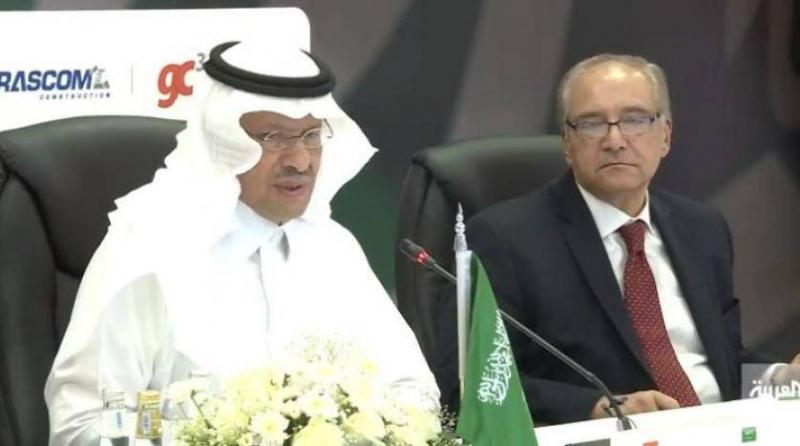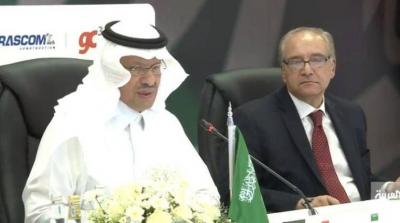Egypt and Saudi Arabia, represented by the Saudi Electricity Company and the Egyptian Electricity Transmission Company, signed contracts for the electrical interconnection project between the two countries today, Tuesday. This was attended by Saudi Energy Minister, Prince Abdulaziz bin Salman, and Egyptian Minister of Electricity and Renewable Energy, Dr. Mohamed Shaker.
The Saudi Energy Minister noted that reaching this important phase of the project marks a culmination of the directives from the leadership of the two brotherly countries, represented by King Salman bin Abdulaziz Al Saud and President Abdel Fattah El-Sisi. He added that the plans for electrical interconnection in the Kingdom generally align with its executive programs stemming from Vision 2030, which is sponsored and supported by Crown Prince Mohammed bin Salman. This vision aims to leverage the Kingdom's strategic location and its possession of the largest electrical network in the Arab world and the Middle East to become a regional hub for electricity trading through interconnection projects with other countries, which will enhance the regional electricity trading market and support the participation of both countries.
On his part, the Egyptian Minister of Electricity and Renewable Energy, Dr. Mohamed Shaker, stated that the project highlights the depth of Egyptian-Saudi relations, and the interconnection between them will be a nucleus for a joint Arab connection, in addition to complementing and supporting the visions of both countries (2030). He further explained that this project represents a strong connection between the two largest electrical networks in the region, which will reflect positively on the stability and increased reliability of electricity supply between the two countries, along with significant economic and developmental returns from trading up to 3000 megawatts of electricity.
Dr. Shaker explained that, in light of the ambitious plans of both countries to expand their reliance on renewable energy sources, this interconnection acts as a safeguard for the two electrical networks to address the inherent instability of renewable energy sources and provides substantial investments to mitigate any resultant effects.
**Project Cost**
Contracts were virtually signed between Riyadh and Cairo with three alliances of global and local companies to implement the interconnection project with a capacity of 3000 megawatts using HVDC technology at 500 kilovolts. The project includes the construction of three high-voltage converter stations: the East Madinah Station and the Tabuk Station in Saudi Arabia, and the Badr Station east of Cairo, connected by overhead transmission lines approximately 1350 meters long and marine cables in the Gulf of Aqaba spanning 22 kilometers, with a total project cost of $1.8 billion.
Upon its operation, the project will achieve a number of mutual benefits for both countries, including enhancing the reliability of national electrical networks, supporting their stability, and maximizing the utilization of available generation capacities alongside the timing differences in their peak electrical loads. It will enable both countries to achieve their ambitious targets for integrating renewable energy sources into the optimal electricity production mix and activating the commercial exchange of electrical energy. Additionally, it will allow the use of the accompanying fiber optic line to enhance telecommunications and information transfer networks between the two countries and neighboring Arab nations, thereby increasing the project's economic returns.
**Alliances**
This distinguished project is one of the most advanced HVDC (High Voltage Direct Current) projects of its kind in the world and is the first HVDC project connecting continents globally. The project will allow both countries to exchange up to 3 gigawatts during peak times, providing energy supplies for over 20 million people using the latest technologies to ensure maximum efficiency. Furthermore, HVDC interconnection will enable both Egypt and Saudi Arabia to improve transmission network efficiency and energy exchange, reducing their overall carbon footprint, as stated by Orascom Construction, one of the companies involved in the alliances for building the interconnection stations.
The company announced that the Orascom Construction alliance with Hitachi ABB Power Grids has signed a contract with the Egyptian Electricity Transmission Company (EETC) to conduct all works in Egypt to connect the national electrical networks of Egypt and Saudi Arabia. A separate alliance from Hitachi ABB Power Grids and SSEM will carry out the works in Saudi Arabia.




